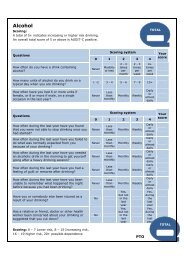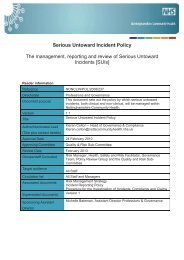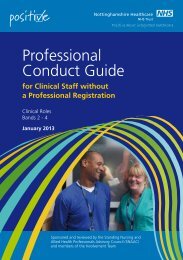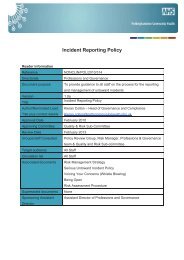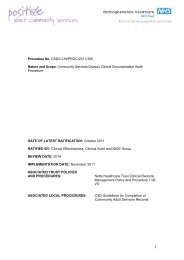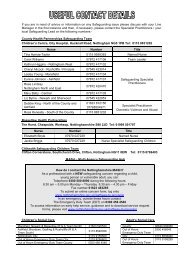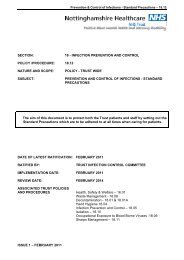Consent to Examination or Treatment Policy - Nottinghamshire ...
Consent to Examination or Treatment Policy - Nottinghamshire ...
Consent to Examination or Treatment Policy - Nottinghamshire ...
Create successful ePaper yourself
Turn your PDF publications into a flip-book with our unique Google optimized e-Paper software.
<strong>Consent</strong> <strong>to</strong> <strong>Examination</strong> <strong>or</strong> <strong>Treatment</strong> – 1.03<br />
21.0 COMPLETING CONSENT FORMS<br />
21.1 The standard consent f<strong>or</strong>m provides space f<strong>or</strong> a health professional <strong>to</strong> provide inf<strong>or</strong>mation <strong>to</strong><br />
patients and <strong>to</strong> sign confirming that they have done so. The health professional providing the<br />
inf<strong>or</strong>mation must be competent <strong>to</strong> do so: either because they themselves carry out the<br />
procedure, <strong>or</strong> because they have received specialist training in advising patients about this<br />
procedure, have been assessed, are aware of their own knowledge limitations and are<br />
subject <strong>to</strong> audit. Inappropriate delegation (e.g. where the health care professional seeking<br />
consent has inadequate knowledge of the procedure) may mean that the consent is not<br />
valid.<br />
21.2 If the patient signs the f<strong>or</strong>m in advance of the procedure (f<strong>or</strong> example in out-patients <strong>or</strong> at a<br />
pre-assessment clinic), a health professional involved in their care on the day should sign<br />
the f<strong>or</strong>m <strong>to</strong> confirm that the patient still wishes <strong>to</strong> go ahead and has had any further<br />
questions answered. It will be appropriate f<strong>or</strong> any member of the healthcare team (f<strong>or</strong><br />
example a nurse admitting the patient f<strong>or</strong> an elective procedure) <strong>to</strong> provide the second<br />
signature, as long as they have access <strong>to</strong> appropriate colleagues <strong>to</strong> answer questions they<br />
cannot handle themselves.<br />
22.0 RESPONSIBILITIES FOR SEEKING CONSENT<br />
22.1 The health professional carrying out the procedure is ultimately responsible f<strong>or</strong> ensuring that<br />
the patient is genuinely consenting <strong>to</strong> what is being done: it is they who will be held<br />
responsible in law if this is challenged later.<br />
22.2 Where <strong>or</strong>al <strong>or</strong> non-verbal consent is being sought at the point the procedure will be carried<br />
out, this will naturally be done by the health professional responsible. However, team w<strong>or</strong>k is<br />
a crucial part of the way the NHS operates, and where written consent is being sought it may<br />
be appropriate f<strong>or</strong> other members of the team <strong>to</strong> participate in the process of seeking<br />
consent.<br />
22.3 It is a health professional’s own responsibility:<br />
• <strong>to</strong> ensure that when they require colleagues <strong>to</strong> seek consent on their behalf they are<br />
confident that the colleague is competent <strong>to</strong> do so; and<br />
• <strong>to</strong> w<strong>or</strong>k within their own competence, and not <strong>to</strong> agree <strong>to</strong> perf<strong>or</strong>m tasks that exceed that<br />
competence.<br />
• If you feel that you are being pressurised <strong>to</strong> seek consent when you do not feel<br />
competent <strong>to</strong> do so this should be addressed through line management.<br />
23.0 ATTENDANCE BY STUDENTS AND TRAINEES<br />
23.1 Where a student <strong>or</strong> trainee health professional is undertaking examination <strong>or</strong> treatment of<br />
the patient where the procedure will further the patient’s care – f<strong>or</strong> example taking a blood<br />
sample f<strong>or</strong> testing – then, assuming the student is appropriately trained in the procedure, the<br />
fact that it is carried out by a student does not alter the nature and purpose of the procedure.<br />
It is theref<strong>or</strong>e not a legal requirement <strong>to</strong> tell the patient that the health professional is a<br />
student, although it would always be good practice <strong>to</strong> do so and consent in the usual way will<br />
still be required.<br />
23.2 In contrast, where a student proposes <strong>to</strong> conduct a physical examination which is not part of<br />
the patient’s care, then it is essential <strong>to</strong> explain that the purpose of the examination is <strong>to</strong><br />
further the student’s training and <strong>to</strong> seek consent f<strong>or</strong> that <strong>to</strong> take place. Again, consent<br />
should be rec<strong>or</strong>ded in the patient's notes.<br />
ISSUE 6 – AUGUST 2012 17



